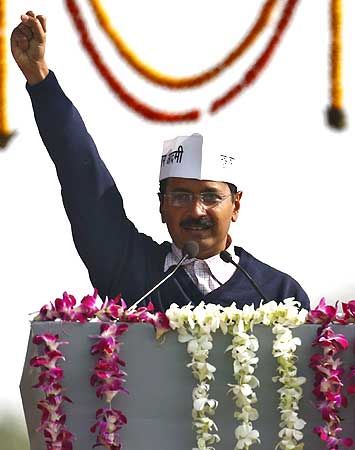 'Modi cannot content himself anymore with merely indulging in Congress bashing and referring to the Gujarat "miracle".'
'Modi cannot content himself anymore with merely indulging in Congress bashing and referring to the Gujarat "miracle".'
'He will have to show that his party is as clean and as innovative as the AAP. And this is impossible because the AAP is new and the BJP is now old.'
Rediff.com begins its coverage of Election 2014 with insightful interviews with experts who know India best.
Today: Christophe Jaffrelot, author of several acclaimed books on Indian politics, speaks to Rediff.com's Archana Masih.
Christophe Jaffrelot, below, left, is a Senior Research Fellow at CNRS (the Centre National de la Recherche Scientifique) and teaches South Asian politics and history at Sciences Po (Paris).
A well-known international scholar specialising on Indian politics, he has written several books focusing on India's democracy, mobilisation of castes and Hindu nationalism.
His forthcoming book on Narendra Modi's experiment with Gujarat will be published in February.
A professor at the King's College India Institute in London and a Princeton Global Scholar at Princeton University, Professor Jaffrelot analyses the dramatic rise and impact of the Aam Aadmi Party in the first part of an e-mail interview with Rediff.com's Archana Masih.
How do you account for the Aam Aadmi Party's ascent, something that has not previously occurred in Indian politics where parties like the Bahujan Samaj Party take years to find a constituency?
The AAP has obviously benefitted from the growing unpopularity of the Congress in Delhi where the anti-incumbency factor, after 15 years of Sheila Dikshit's rule, has played a major role.
But the party has also capitalised on the anti-corruption campaign of Anna Hazare in which Arvind Kejriwal played a major role - and which had somewhat re-politicised the urban middle class of the state.
Last but not least, the AAP has been able to go beyond this constituency and reach out to slum dwellers, something few parties do.
At the same time, the rise of the AAP needs to be qualified: It has contested elections in only one city of the country so far.
It may take AAP as much time as it has taken to the BSP to become a national party.
Would you compare the AAP's rise to a Janata Party-like phenomenon in March 1977 where a new party cashed in on the anger and resentment against the Congress party?
No, there is no comparison. The Janata Party resulted from the merger of existing political parties whose leaders had been sent to jail by Indira and Sanjay Gandhi.
The government of Manmohan Singh has been rejected for other reasons -- corrupt practices mostly -- and in a more spontaneous way.
It (the AAP) has emerged from a popular movement. If one comparison can be made, it's between the JP (Jayaprakash Narayan).
The only common feature is the anger of the people regarding corruption.
Do you believe the AAP could have a lasting impact in Indian politics? Or will it be tripped up by the burden of expectations that it seems to invite with each passing day?
Expectations should continue to rise and to support the rise of the AAP till the Lok Sabha elections, then, the accountability factor will become more important.
It will also depend upon the capacity of the AAP to resist the rise of Modi in the political arena of urban India.
Do you think now that the AAP has achieved the improbable -- actually formed a government which appeared beyond the ability of similar people's groups that became political parties like the Lok Satta party -- it has struck a chord with many Indians who despise politics and the way Indian politicians practice their politics?
This constituency was attracted by the AAP before the party formed the government.
The attraction may continue if Kejriwal can recruit good party cadres and nominate good candidates out of Delhi.
For that, the AAP will also need funds. Many parties are now giving tickets to those who can pay for their electoral expenditures -- irrespective of their past records and ideology. The AAP will only be able to avoid these pitfalls if the party gets funds.
Would a party like the AAP be confined only to urban India and pockets of the Indian middle class which seems to be in constant anguish over injustices real and perceived?
The AAP will not be able to reach out to rural India easily, for sure: you do not build a party machine across huge states like UP and Madhya Pradesh in a few months. But if it contests elections in urban seats, that will already be a great achievement -- and India is getting urbanised rather rapidly with semi-urban seats replacing rural seats at a quick pace.
Could the AAP hope to ever make an impact in rural India? Or would this be dependent on forming alliances with like-minded parties -- say the Left -- to reach out to their constituencies?
It is very difficult to say whether the Left would be natural allies of the AAP.
Certainly, the party carries some socialist legacy, but Indian Socialists have not often partnered with trhe Communists. And the CPI and CPI-M are not present in many places out of West Bengal and Kerala anyway.
This coalition business will also be complicated because the AAP has emerged from an anti-corruption movement which targeted the political class as a whole.
It may easily lose its charm if it joins hands with its enemies of yesterday, except if they are junior partners like the Congress in Delhi today.
Do you believe the AAP and its ideas could change political discourse in the country and compel other political parties to do things differently?
It has already happened: The Lokpal Bill would have not been passed had not the AAP won the Delhi election.
Its leaders may compel the other parties to behave in a better manner if they continue to be looked at as role models, deliver and resist the temptations of power.
Do the national parties have a stake in ensuring that the AAP does not succeed, because success would mean that all these parties would have to quickly change years of the way they have conducted political business?
Of course: The AAP is a competitor for the existing parties -- so why should they be happy with its success?
 Have the AAP and Arvind Kejriwal become the biggest challengers to Narendra Modi?
Have the AAP and Arvind Kejriwal become the biggest challengers to Narendra Modi?
Kejriwal will force Modi to change his electoral campaign indeed.
Modi cannot content himself anymore with merely indulging in Congress bashing and referring to the Gujarat 'miracle'.
He will have to show that his party is as clean and as innovative as the AAP. And this is impossible because AAP is new and the BJP is now old: The people have tried it already.
What they have not tried already is Modi, and this is what may make the difference.
Do you believe that the AAP has to some extent extinguished the anti-Congress fire, giving that party a chance to regroup and recast its strategy for the general election? Or it that hoping for too much?
The AAP has added to the fire. In fact the Anna Hazare movement has started it.
But the media may underestimate the resilience of the Congress and its capacity to relate to others -- including as a junior partner, as evident from the support it is now giving to the AAP government in Delhi.
Before the AAP's win, Narendra Modi was riding high. Now, that does not seem to be the case. There appears to be an uncertainty on where the BJP should direct its fire -- at the AAP or the Congress. Do you think the AAP could halt Modi's march?
It all depends on the kind of challenge the AAP may represent for the BJP in the cities.
In a large metropolis, like Delhi, Mumbai and Bangalore, the AAP may field good candidates, but the BJP has a strong following among the middle class of smaller cities.
Part II: 'Congress has underestimated the resentment of the people'
Image: Arvind Kejriwal at his swearing-in ceremony at the Ramlila ground in New Delhi. Photograph: Anindito Mukherjee/Reuters. Inset: Christophe Jaffrelot.










